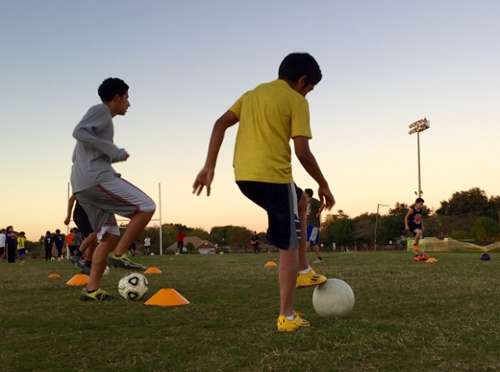Program tackles obesity through nutrition literacy and soccer

Nearly 20 percent of children in the United States are obese, according to the Centers for Disease Control. The problem is especially acute among minority children, particularly Hispanics and blacks, whose obesity rates hover at about 22 percent compared to 14 percent for white children.
The University of Texas at Arlington's College of Nursing and Health Innovation is taking steps to address this obesity crisis. For the last several months, nursing and kinesiology faculty and students have been working on a pilot research study at Young Men's Leadership Academy, a predominantly Latino all-male middle school in the Grand Prairie Independent School District.
The study uses two popular strategies to tackle obesity: nutrition literacy and exercise.
"The nutrition component deals with reading labels, food portions, and explaining what's a carb, vitamin or fat," explained Dr. Margarita Trevino, an associate professor of clinical nursing and director of the college's Center for Hispanic Studies in Nursing and Health. "We teach them to understand if something has too much fat, salt or enough protein. It's very simple but it is fundamental to critical thinking skills that will translate into good health habits."
David Espinosa, a UTA alumnus and Grand Prairie ISD board member, praised UTA's commitment to improving health and wellness among school age children.
"Middle school is an ideal stage for teaching children about nutrition and health," Espinosa said. "By learning these lessons at an early age they will develop habits that will enhance the length and quality of their lives. They will become more physically fit, develop a stronger self-image and perform better in the classroom."
Two senior nursing students, Megan Isaacs and Lisa Durham, played key roles in the development of the nutrition education classes for the students. Trevino said the pilot project is an outgrowth of a 2014 plan by a UTA think tank to do more to serve surrounding communities. Improving health and the human condition is one of the four main themes of UTA's Strategic Plan | 2020.
Trevino said Grand Prairie was chosen to kick off the pilot project because of the pockets of low-income neighborhoods that dot some parts of the city and also because a preliminary examination showed that many of the children are pre-disposed to diabetes, hypertension and obesity.
"We wanted to see if we could change health or lifestyle pattern by increasing levels of physical activity and health literacy," Trevino said. "Soccer is very popular with students at the school, and so faculty members decided to use it to entice them to participate in the study."
Larry Nelson, an associate professor of kinesiology, said the team wants to measure how much physical activity the children are getting in soccer. He said they would like to put accelerometers on the boys to measure the amount of physical activity they're getting not only on the soccer field but also in every waking minute.
"What that does is give us a nice profile of how much physical activity they are getting at this age and how much the soccer program is contributing to that physical activity output," he said. "What we plan to do with this data is show that this is a really big health enhancing activity that we're delivering to this population."
Nelson said he and his students are still in the data-gathering phase but they expect to find significant results.
"That helps us to go after funding and really try to expand the program into other junior high schools in the district and try to keep it going," he said. "This gives us proof that we are providing a lot of exercise to the kids and then we can secure funding to expand it."
Trevino said the long-term goal is to grow the program throughout the district. That, she added, could have significant ramifications in all spheres of the lives of these children. "As children's health improves, grades improve and children are less likely to have high rate of absenteeism," she said.
















